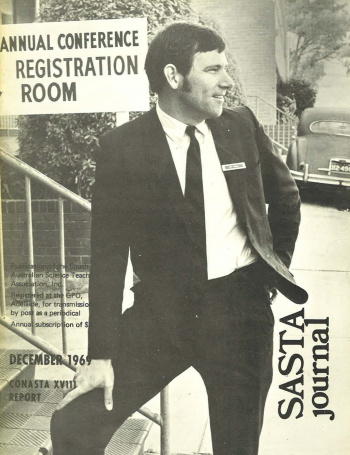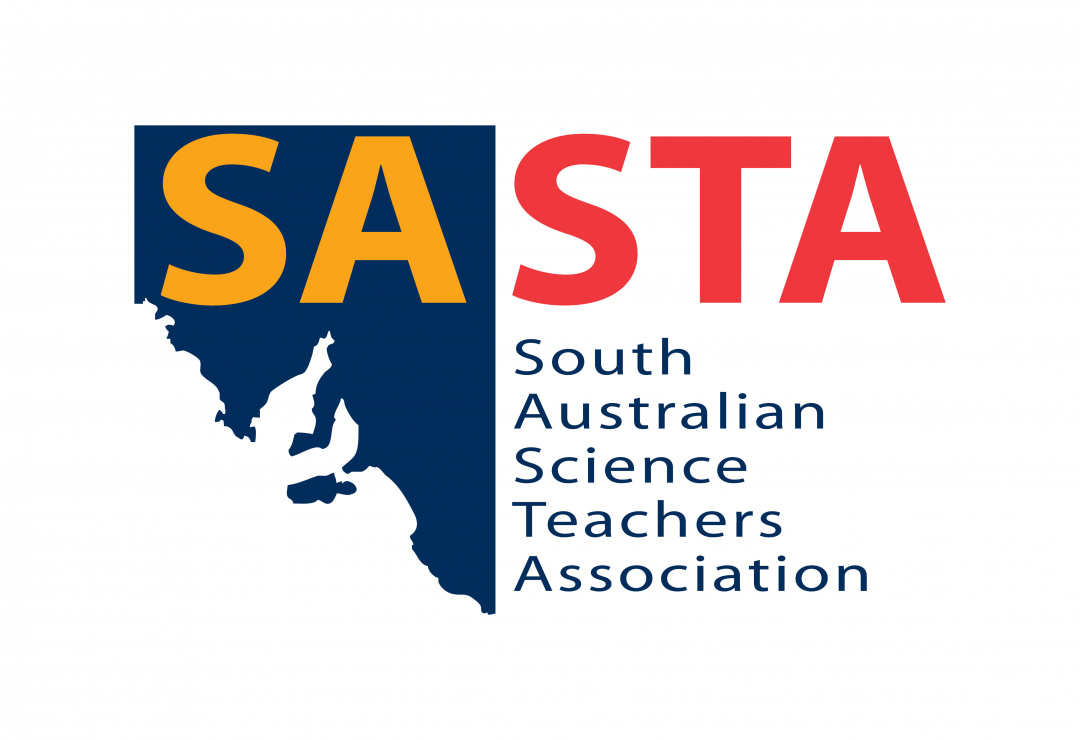Posted by SASTA
on 23/03/2021

The Annual Conference over the years...
SASTA held many professional learning events in its early years, however the first reference to 'the Annual SASTA Conference' was mentioned in the June 1971 Journal. The first Annual Conference was convened by Deane Hutton, Science TV presenter, and cost $1.00 for members and $2.00 for members!
In the 2010 Conference Program booklet, President Bronwyn Mart wrote "The SASTA Conference has built a reputation as being the premier professional event for science educators in South Australia. Our commitment to improving professional knowledge and skills, coupled with a desire to share our stories of success brings together teachers, lab officers, tertiary students and educators. The success of the Conference is due to the commitment and support of a range of individuals and organisations." This is all still true today and we are very appreciative of all the support we receive to keep the Annual Conference running after 50 years!
Take a walk down memory lane with some reflections from past Conference Convenors and a list of past Conference themes. We'd love to hear about your experiences with the Annual Conference over the years - tegan@sasta.asn.au
The Annual Conference has been an institution for decades. I was always amazed at the number of people who would volunteer their time to either help organise or present workshops to their professional colleagues. Having schools prepared to open their laboratories and classrooms made the job of organising the event so much easier. Over time, the conference changed venues less often. This way teething problems with supply of equipment, IT issues and catering would reduce as the school became familiar with needs of the conference. I always found the mix between cutting-edge lectures by local or interstate experts was well balanced by workshops presented by educators, where various activities and teaching ideas were presented and could be used immediately in the classroom.
Finding recipients for the various awards has always been difficult. Not because of the quality of the winners but due to the reticence of teachers to talk about their achievements. Teachers have always been team players, not wanting to stand out from the crowd. However, the talent of the various award winners made them worthy recipients.
It was inspiring to see teachers, both offering workshops and receiving awards, and how they were improving the academic lives of their students.
Chris Jordison, past Annual Conference Convenor & chair of the Professional Development Reference Group
My very first SASTA conference was in 1986, at a local Teachers College destined to become part of UniSA after the amalgamations in the early 1990s. It was an amazing experience for a brand new science teacher to listen to the likes of Dr Cliff Malcolm from Victoria, Professor Ian Lowe from Queensland and Professor Colin Power of Flinders University, SA. I was also blown away to hear the myriad of roles undertaken by Peter Schodde recounted during the testimonial read out before he accepted his SASTA Medal. The only down side was lining up in the cafeteria to buy our own lunch, which was not included in those days. All of the conference participants arrived after the students – preservice teaching students – had already formed a long queue, and most of us had to return hungry to the conference for the afternoon keynote. My recollection is that it was not long before morning tea, lunch and the Happy Hour were included in the cost of conference registration – a great improvement!
One of the most memorable presentations I have ever heard was the keynote at the 2018 SASTA Annual Conference, held at Adelaide High. While the title: Why is evolutionary biology more than just an academic interest, sounded a bit dry, Professor Steve Donnellan, South Australian Museum, Evolutionary Biology Unit came highly recommended as an entertaining and informative speaker. He did not disappoint.
The context for his talk was the Giant Australian Cuttlefish (Sepia apama), that each year aggregates to mate and spawn on a discrete area of northern Spencer Gulf, just north of Whyalla. Judging from the photographs and videos that Steve showed us, this is an amazing spectacle. Tens of thousands of these incredible creatures aggregate, demonstrating their expert colour changers and mastery of camouflage by changing shape and texture to look like the surrounding environment. Steve is part of a group looking at their population dynamics, as there are many threats to these amazing animals. One is their own life history, as the cuttlefish only live for 12–18 months and mating is the final act of their short lives. Steve regaled us with descriptions of their range of unusual sexual antics, easily witnessed by snorkellers and divers!
It is pleasing to know that a worrying decline in the population seen in 2013, has now been completely reversed, with record populations seen in 2020. This suggests that “boom and bust” are a natural part of the population fluctuations of the Giant Cuttlefish
Jane Wright, current Annual Conference Convenor & chair of the Professional Development Reference Group
Conference Themes

| 1971 | Science and the community | Salisbury Teachers College |
| 1972 | Bedford Park Teachers College | |
| 1973 | Salisbury College of Advanced Education | |
| 1974 | No information available | |
| 1975 | No information available | |
| 1976 | Torrens College of Advanced Education | |
| 1977 | No information available | |
| 1978 | No information available | |
| 1979 | Science education & technology | SA Institute of Technology |
| 1980 | Science teaching: a human perspective | South Australian College of Advanced Education |
| 1981 | The why, what and how of teaching science | Regency Park Community College |
| 1982 | Science teaching: our schools and their purposes into the 80s, putting theory into practice | Roseworthy Agriculture College |
| 1983 | Is Science practical? | South Australian College of Advanced Education |
| 1984 | Futures study and Science education 1984 - 2001 | The University of Adelaide |
| 1985 | Changes in the value of Science | Flinders University |
| 1986 | Flinders University | |
| 1987 | Now & the future: implications for science education | SA Institute of Technology |
| 1988 | Science for all | The University of Adelaide |
| 1989 | Links | Flinders University |
| 1990 | Excellence in science teaching | Gilles Plains College of TAFE |
| 1991 | CONASTA held in Adelaide | |
| 1992 | Australian Mineral Foundation | |
| 1993 | Science with meaning | Adelaide Hilton |
| 1994 | Responding to changes in Science Education | Adelaide Hilton |
| 1995 | Working scientifically | Adelaide Hilton |
| 1996 | Students, Science and success | Stamford Grand |
| 1997 | Science & the community | UniSA, Levels Campus |
| 1998 | Kids and science | UniSA, City West Campus |
| 1999 | CONASTA held in Adelaide | |
| 2000 | Walford Anglican School for Girls | |
| 2001 | The State of Science: forging the future for South Australian Science | Saint Ignatius College |
| 2002 | Teaching for Understanding: teaching and learning of science through its social context | Saint Ignatius College |
| 2003 | Saint Ignatius College | |
| 2004 | Saint Ignatius College | |
| 2005 | Saint Ignatius College | |
| 2006 | CONASTA held in Adelaide | |
| 2007 | Australian Science and Mathematics School | |
| 2008 | Rise to the top | Rostrevor College |
| 2009 | Rostrevor College | |
| 2010 | Rostrevor College | |
| 2011 | Happy 60th Birthday | Immanuel College |
| 2012 | Sustainability | Immanuel College |
| 2013 | Science: From the Classroom to the Workplace | Immanuel College |
| 2015 | Light and Light-Based Technologies | Brighton Secondary School |
| 2016 | Raising Standards of Teaching & Learning | Brighton Secondary School |
| 2017 | Human Endeavours' | Brighton Secondary School |
| 2018 | Spotlight on the Science in STEM | Adelaide High School |
| 2019 | Thinking Science | Pulteney Grammar School |
| 2020 | No Conference due to COVID-19 | |
| 2021 | Science: saving the planet | Pulteney Grammar School |
In this Section
Archive
- February 2026
- January 2026
- December 2025
- November 2025
- October 2025
- September 2025
- August 2025
- July 2025
- June 2025
- May 2025
- April 2025
- March 2025
- February 2025
- January 2025
- December 2024
- November 2024
- October 2024
- September 2024
- August 2024
- July 2024
- June 2024
- May 2024
- April 2024
- March 2024
- February 2024
- December 2023
- November 2023
- October 2023
- September 2023
- July 2023
- June 2023
- May 2023
- April 2023
- March 2023
- February 2023
- January 2023
- December 2022
- November 2022
- October 2022
- August 2022
- July 2022
- June 2022
- May 2022
- April 2022
- March 2022
- February 2022
- January 2022
- December 2021
- November 2021
- October 2021
- September 2021
- August 2021
- July 2021
- June 2021
- May 2021
- April 2021
- March 2021
- February 2021
- January 2021
- December 2020
- November 2020
- October 2020
- September 2020
- August 2020
- July 2020
- June 2020
- May 2020
- April 2020
- October 2018
- September 2018
- August 2018
- July 2018

